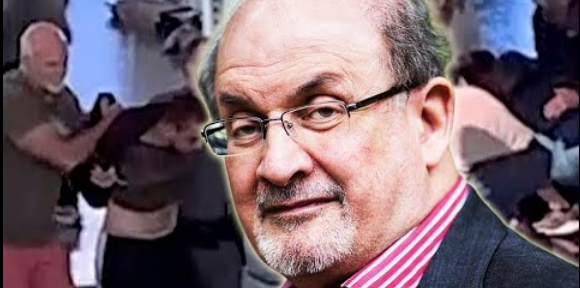Photos: YouTube
I will defend freedom to write to the grave.
Over the weekend, I got a rare privilege and appeared on BBC frontline together with the English PEN President Ms. Maureen Freely and also the PEN international president Mr. Burhan Sönmez to discuss freedom to write.
This distinguished program was arranged by the BBC’s Arts and Culture department in reaction to the attempted assassination of a famous Indian-British Novelist, Salman Rushdie,75, who was stabbed when he was about to speak in an upscale location in New York a couple of days ago.
For over 30 years, Rushdie’s life has been in danger because of a fatwā, an Islamic formal edict, issued by the late Ayatollah of Iran, Ruhollah Khomeini, after the novelist published his controversial novel “Satanic Verses“. Many of the Islamic faith see it as a work of blasphemy against prophet Mohammed and their cherished religion in general.
Salman’s attacker, a 24-year-old American of Lebanese descent, Hadi Matar, was quickly apprehended and produced in court and charged with second degree attempted murder and assault, which charges he denied.
When I was violently arrested from my home in December last year, and in January 2022 smuggled into court after I had spent weeks going through harrowing torture in the Ugandan Special Forces Command dungeons, the whole world was on my side as a writer. PEN centers across the world, newspapers, televisions and civil society organizations were concerned about my situation and advocated for my immediate unconditional release.
When graphic pictures of my scarred body went viral, the whole world –except chamchas, or acolytes of the Museveni rogue regime– stood with me as a defender of truth armed with a mere pen and an independent mind.
The Ugandan court, presided over by Dr. Douglas Singiza, was supposed to, in accordance with the law, observe my rights and report abuse of the same and stay the proceedings. Instead Singiza returner me to prison in my despicable state–oozing pus from the dermatological ulcerations all over my body and swollen joints and fractured ankle.
The right-thinking humans of the world wondered what kind of a judicial officer could remand a visibly tortured person to prison contrary to Prevention and Prohibition of Torture Act, 2012 laws of Uganda. Everyone in this 21st century must know, as Dr. Nanson Kahyana elucidated, that while soldiers are armed with guns and tanks to defend a country from wars and external aggression, writers on the other hand are armed with pens to defend the countries from greed, impunity, autocracy, mediocracy and arrogance of leaders who think of themselves as gods.
The freedom to write should never be only about heaping encomiums but also to write unflatteringly. Otherwise writers become just automatons. Robots for hire. As Salman Rushdie, the stabbed novelist said, freedom to write without freedom to offend is useless.
In this age, there should never be a religion, political organization or belief that is greater than the right to live. If defending such beliefs calls for deaths or torture of those who disagree, in total disregard of human rights laws, then such inherited dogmas do not fit in this civilization where civil liberties and freedom are cherished. No one or no belief or organization should declare themselves immune from criticism; deflecting criticism with threatening life arbitrarily is a justification for abolishing such beliefs.
Freedom to write, of speech and expression, as long as you are not slandering or glorifying violence and a few other exceptions, is non-negotiable and I will fiercely defend that freedom to my grave.
There is no justification for threatening someone’s life simply because he or she has exercised his freedom of thought, to write, speech and expression. In Uganda there are those who are ensconced in echelons of power who, in need to deflect criticism, came up with stupid laws like Section 25 of the Computer Misuse Act. They will open their mouths to tell critics that we must respect such a bad law. Just to remind you, even apartheid in south Africa was legal and the apartheid regime expected citizens to respect the laws upholding racism.
Writers have freedom to describe things and such freedom can never be taken away by an individual, government or a religion. If you cannot agree with what someone writes or says, at least defend their right to say or write it.
If you see someone out there broadcasting balderdash in defense of torture, violence and barbarism, then you know that they belong to the stone age and are not fit to live in this contemporary society where freedom from torture and the right to live are inviolable.
If we have useless leaders that have sunk the country to the abyss of imbroglio and that of the future into indescribable hopelessness and as a result, we get extremely angry, a caboodle of hoodlums acting in the name of the cataclysmic or misanthropic state must not deflect the blame and begin to threaten those who challenge them with death and inhuman treatment.
I want my right to write about thieves, dictators, murderers, greedy politicians with bottomless stomachs, malingerers, those with penchants for opulence, election riggers and every state inspired impunity we are enmeshed in without fear of being tortured or killed.
Kakwenza Rukirabashaija is an exiled Novelist and a scholar of PEN-Zentrum Deutschland Twitter: @KakwenzaRukira







